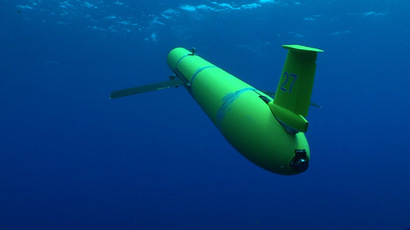US House denies Pentagon funds to tackle climate change as security threat

The US House has voted to deny the Pentagon funding to combat impacts of climate change and its own heavy dependence on fossil fuels. The Department has long acknowledged the realities of global warming amid political wrangling over its effects.
The House voted, mostly along party lines, to pass an amendment to the National Defense Authorization Act (NDAA) that aims to prevent the Pentagon from using appropriated funding to address the myriad national security concerns the Department of Defense (DOD) has said climate change poses to American interests.
The amendment to the NDAA, which sets the terms of the DOD budget, was sponsored by Rep. David McKinley (R), whose home state of West Virginia is deeply invested in coal development.
The full text of the amendment reads:
“None of the funds authorized to be appropriated or otherwise made available by this Act may be used to implement the U.S. Global Change Research Program National Climate Assessment, the Intergovernmental Panel on Climate Change’s Fifth Assessment Report, the United Nation’s Agenda 21 sustainable development plan, or the May 2013 Technical Update of the Social Cost of Carbon for Regulatory Impact Analysis Under Executive Order.”
In response, Democratic Reps. Henry Waxman and Bobby Rush said the “McKinley amendment would require the Defense Department to assume that the cost of carbon pollution is zero,” in a letter to House colleagues before Thursday’s vote. “That’s science denial at its worst and it fails our moral obligation to our children and grandchildren.”
The amendment specifically targets the findings and recommendations of the recent National Climate Assessment (NCA) and the latest yearly climate report from the United Nations-sponsored Intergovernmental Panel on Climate Change (IPCC).
Released early this month, the federal government’s NCA outlined a stark picture regarding what the US climate will look like moving forward. Rising sea levels on the American coasts are one major area of concern, with the report projecting they will rise at least one foot by the end of the century.
"Climate change is not a distant threat," said John Holdren of White House Office of Science and Technology Policy. "It already is affecting every region of the country and key sectors of the economy."
The latest IPCC report implored immediate and drastic international cooperation to avoid catastrophic effects on many areas of the world, the worst impacts of which will likely be felt by those already mired in poverty.
‘Clean’ power plants and nuclear stations need to triple their energy output to avoid a global warming doomsday, the report said, adding that more than $17 trillion in investment in the next 21 years is needed to meet electricity demand alone.
Fresh investment into renewables, nuclear, and carbon energy capture and storage must rise by $147 billion, and an increase of $336 billion is needed on making buildings and transportation more energy efficient, IPCC researchers said in Berlin last month.
Also earlier this month, a group of 16 former US military generals and admirals said climate change will harm American national security and cause or exacerbate regional and ethnic conflicts over food and water throughout the globe, especially in the developing world.
“In Africa, Asia, and the Middle East, we are already seeing how the impacts of extreme weather, such as prolonged drought and flooding – and resulting food shortages, desertification, population dislocation and mass migration, and sea level rise – are posing security challenges to these regions’ governments. We see these trends growing and accelerating," The Center for Naval Analyses (CAN) Military Advisory Board said in its report.
Vice Admiral Lee Gunn (Ret.), and president of CNA Corporation’s Institute for Public Research, said“the American military, the single largest user of oil in the U.S., has recently begun transitioning to renewable and more efficient energy to improve its operational effectiveness and flexibility, with the added benefit of beginning to reduce its fossil fuel dependence and mitigate climate change.”
“Civilian and uniformed leaders of our military know it is increasingly risky to depend on a single fuel source; these leaders are diversifying the military’s sources of power to make our bases more resilient and our forces more effective,” added Vice Admiral Gunn.
In its own four-year assessment of global threats, the Pentagon recently stressed that an erratic climate will likely cause increased “terrorist activity,” among other impacts.
"Climate change poses another significant challenge for the United States and the world at large. As greenhouse gas emissions increase, sea levels are rising, average global temperatures are increasing, and severe weather patterns are accelerating,” the Pentagon said in its latest 2014 Quadrennial Defense Review.
The NDAA later passed the Republican-led House by a vote of 325 to 98. It is yet to be seen whether the Democratic-led Senate will adopt the amendment in their version of the NDAA. Once the two chambers have passed their versions of the bill, they will meet in conference to reconcile their differences before final passage.
Later in the year, Congress will vote on how to appropriate within the DOD the approved funding.
Meanwhile, liberal billionaire and self-identified environmentalist Tom Steyer announced Thursday he will spend as much as $100 million this election season through a new Super PAC – NextGen Climate Action – to defeat certain Republicans who deny climate-change science.














